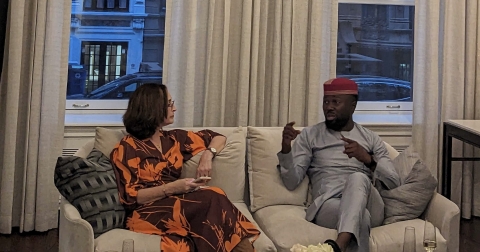
Many questions remain unanswered following the death of Yevgeny Prigozhin, the former head of Russia’s Wagner Group who was killed when his plane crashed in August. Among them: What does it mean for the mercenary group in Africa, whose activities are helping to fund the war in Ukraine?
It’s a question that Nigerian journalist Philip Obaji Jr. is seeking to answer as an ICFJ Jim Hoge Reporting Fellow. ICFJ is honoring Jim Hoge’s commitment to journalistic integrity and his passion for helping young journalists through The Jim Hoge Legacy Fund.
Obaji has reported on the Wagner Group in the Central African Republic (CAR) and Mali for over two years. A correspondent for The Daily Beast, his reporting focuses on those who survived the Wagner Group’s crimes, as well as on uncovering how Russia, Wagner and African countries work together.
ICFJ hosted Obaji last week for a Q&A event moderated by ICFJ President Sharon Moshavi in New York City. Here’s what was discussed:
Wagner Group Crimes in Africa
Obaji recounted one attack in May, when Wagner mercenaries and Malian forces went into the village of Moura, Mali looking for armed militants. According to a United Nations report, troops overseen by Wagner mercenaries killed over 500 people – most of whom were unarmed civilians.
The Moura tragedy is just one instance of Wagner troops murdering, torturing and raping civilians. Obaji has uncovered at least 100 instances of human rights abuses, including a report on Wagner troops torturing and raping allied soldiers. And the United Nations found there is “an overall climate of terror and complete impunity for victims of the Wagner Group’s abuses” in Africa.
When Central African Republic President Faustin-Archange Touadéra came to power in 2016, most of the country was run by militias, Obaji explained. Touadéra turned to Russia for help. The deal, according to Obaji? Russia would help lift the UN arms embargo on CAR and bring Russian fighters into the country, and CAR would give them control of its diamond and gold mines.
When the Wagner Group arrived, mercenaries started going from community to community to gain control of the rebel-run mines, killing civilians in the process, said Obaji. Wagner has followed this strategy for five years now and has expanded to other African countries such as Mali, Obaji explained. “A lot of families have lost their loved ones because the Russians wanted to gain control of the mines,” he said.
Working from Cameroon, which shares a border with CAR, Obaji meets with victims who have fled. Sometimes, he ventures into CAR despite the risks. “It's very difficult to go into CAR because I think the people know me very well, know me enough to either kill or capture me, which is the instructions that some of the commanders give to the mercenaries,” he shared.
Russian Disinformation is Everywhere in Africa
“Russia has got a very, very good structure for disinformation campaigns across Africa,” explained Obaji, who investigated Russian disinformation across the continent. What he found is alarming: Russia spreads disinformation all across West and Central Africa, through social media but also mainstream media, print media and broadcast media.
Obaji discovered that a lot of media in West Africa, including some countries’ most prominent outlets, were being paid to publish misinformation about the West. “I found that some of them do not even know what they were doing was part of helping Russia promote its disinformation campaigns,” he said.
Consequences of the Coup on the Wagner Group’s Activities in Africa
While the Wagner Group’s June coup attempt in Russia has led to some mercenaries leaving Africa, the group is still present in the region, said Obaji, who plans on using his ICFJ fellowship to understand how the Russian government has been working with CAR and Mali since Prigozhin’s death.
According to Obaji, the Russian government has asked Wagner mercenaries to sign contracts with the Ministry of Defense, effectively blurring the line between the Russian government and the Wagner Group. Investigating what happened between Wagner, Russia and African countries in the months after the coup attempt could help explain how Wagner’s role in Africa will change moving forward.
Wagner-Controlled Diamond Mines Could Be Funding Russia’s War in Ukraine
Through his fellowship, Obaji also wants to estimate how much money Russia is making off of mining in West Africa, and how much of it is financing the war in Ukraine.
“We all believe that the gold and diamonds in the Central African Republic are somehow, to some extent, useful in terms of where Russia gets money to finance the war in Ukraine,” he said. “A fraction of what Russia spends in Ukraine, I believe, has come from Africa because we have about 300 gold developments in the Central African Republic.”
Russia and China are Cohabitating in Africa
When asked about the relationship between Russia and China in Africa, Obaji recounted a tense episode that occurred in March of this year. While Vladimir Putin and Xi Jinping were meeting in Moscow, he said, gunmen went into a Chinese-controlled diamond mine in CAR and killed nine Chinese miners. While Wagner's involvement is disputed by official government sources, multiple sources told Obaji they saw Wagner mercenaries enter the mine ahead of the attack.
Obaji’s story created a sensitive situation for both countries, he said, with Chinese officials and journalists calling him to learn more about the incident.